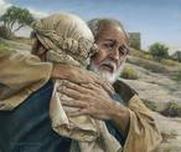Cultural Insights
in the Prodigal Son ~ Luke 15.11-12

Decades of life and ministry in the Middle East and a lifelong fascination with the
parable of the Prodigal Son have combined to give Kenneth Bailey a unique perspective
on the parable. We find his insights in several excellent books:
Kenneth E. Bailey, The Cross & the Prodigal, IVP, 1973, 2005.
_______________, Finding the Lost, 1992.
_______________, Jacob and the Prodigal, 2003.
Two of Bailey's basic convictions are found in the following statements:
1) “The culture of the speaker must be penetrated if what is said is to be understood. Even so with the life and
teachings of Jesus.” (The Cross & the Prodigal, 11)
2) "Middle Eastern culture was a better lens through which to examine the parables of Jesus than my inherited
contemporary American culture.” (The Cross & the Prodigal, 11)
Reading Assignment ~ Read The Cross & the Prodigal, pages 26-89.
Luke 15.11-12
1) Read Luke 15.11-12, the first scene of the parable of the Prodigal Son, carefully.
2) Look over the following questions:
1) What is the significance of the man having two sons?
2) What were the cultural implications of the younger son's request for his inheritance?
3) Did Palestinian inheritance laws ever allow for inheritance before the father's death?
4) How would the inheritance have been divided between the two sons?
5) What does the younger son's request reveal about him?
6) What do these verses reveal about the older son?
7) What do these verses reveal about the father?
3) Consider insights you have gained from your reading assignment that speak to these questions and help us
understand the cultural setting of the situation of the opening verses of the parable of the Prodigal Son.
4) Double-check your memory by reading through the answers/insights found at this link.
STEPPING OUT ~ Compose a 100-200 word devotional based on one insight you have gained into the cultural
context of this section of the parable of the Prodigal Son.
parable of the Prodigal Son have combined to give Kenneth Bailey a unique perspective
on the parable. We find his insights in several excellent books:
Kenneth E. Bailey, The Cross & the Prodigal, IVP, 1973, 2005.
_______________, Finding the Lost, 1992.
_______________, Jacob and the Prodigal, 2003.
Two of Bailey's basic convictions are found in the following statements:
1) “The culture of the speaker must be penetrated if what is said is to be understood. Even so with the life and
teachings of Jesus.” (The Cross & the Prodigal, 11)
2) "Middle Eastern culture was a better lens through which to examine the parables of Jesus than my inherited
contemporary American culture.” (The Cross & the Prodigal, 11)
Reading Assignment ~ Read The Cross & the Prodigal, pages 26-89.
Luke 15.11-12
1) Read Luke 15.11-12, the first scene of the parable of the Prodigal Son, carefully.
2) Look over the following questions:
1) What is the significance of the man having two sons?
2) What were the cultural implications of the younger son's request for his inheritance?
3) Did Palestinian inheritance laws ever allow for inheritance before the father's death?
4) How would the inheritance have been divided between the two sons?
5) What does the younger son's request reveal about him?
6) What do these verses reveal about the older son?
7) What do these verses reveal about the father?
3) Consider insights you have gained from your reading assignment that speak to these questions and help us
understand the cultural setting of the situation of the opening verses of the parable of the Prodigal Son.
4) Double-check your memory by reading through the answers/insights found at this link.
STEPPING OUT ~ Compose a 100-200 word devotional based on one insight you have gained into the cultural
context of this section of the parable of the Prodigal Son.
